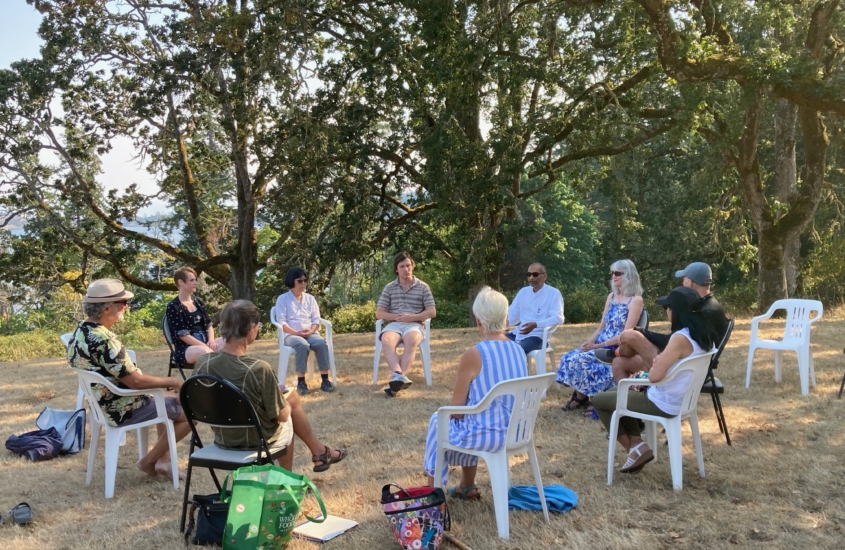Meditative Self-inquiry with Mukesh Gupta, July 14, 2024
Meditative Self-inquiry
July 14, 2024
With Mukesh Gupta
At KECC Metchosin, BC
Twelve people in total were present for this Sunday meeting at the Swanwick Road location of the Krishnamurti Educational Centre of Canada. It was a lovely, sunny day which supported our sitting on the lawn in front of the Main House. The Meeting was started by Mukesh, our facilitator, asking for a period of silence during which participants could sink into a space of silent attention. He then gave a brief introduction to the principles of self-inquiry.
Self-inquiry, Mukesh explained, is not a debate where we exchange knowledge. We connect in a space of openness and compassionate communication which is beyond the words used and which may carry a sense of wonder. We are not looking for final answers to the problems of life and yet something deeper than conventional thinking may come into existence through our dialogue.
In recent sessions we had been making use of The Book of Life: Daily Meditations with Krishnamurti as a resource to activate our explorations. The July 14 selection from the book was read aloud and opportunity was offered to share any questions or issues arising within our group with the reading and with our individual processes of self-inquiry. One person shared some questions about the difference between conscious and unconscious sorrow. There are innumerable forms of sorrow, she said, and without understanding sorrow there is suffering of various kinds, conscious and unconscious. When we speak of the ending of sorrow, we intend to end it at all levels of ourselves.
Mukesh pointed out that we must proceed very slowly and concisely. Firstly, he asked, how are we in contact with the unconscious sorrows? And how do we avoid them? There was some discussion of our desire to keep our self-images intact. It was deemed necessary to be “naked” to ourselves and to be willing to reveal ourselves to others and to ourselves. This brought in the issue of the separation we may usually feel between ourselves and others and questions were asked. Is the separation real? Can we do anything about it? How effective is it to observe how the mind constructs reality? Is the investigation into psychological sorrow optional or necessary? Is the core issue that we have lost the recognition of our divinity?
Mukesh introduced the role of attachment in our way of thinking and acting. We are attached in many ways to the forms of the body, the mind, and are also burdened by our own self-pity. Can there be a sorrow free from self-pity, one that can shift and change? What does it mean to really “be with” our feelings of sorrow? Can such awareness open a door to a deeper experience?
Our “time” ran out and the meeting was brought to an end. We engaged in friendly talk while enjoying some snacks before participants went their separate ways. It was a good gathering which was apparently enjoyed by most or all.
DB



